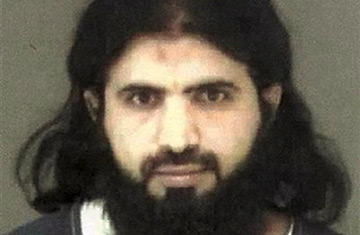
Ali Saleh Kahlah al-Marri, the Qatari national and suspected al Qaeda operative, and the only person being held in the United States as an 'enemy combatant.'
(2 of 2)
Though compelling, the panel's conclusion is not obvious, and the full court to which the Administration has appealed may disagree (as might the U.S. Supreme Court, if it ever hears the case). The Administration, then, can't necessarily be blamed for trying to treat al-Marri as an enemy combatant so that it could detain him indefinitely and prevent him from rejoining the enemy during the war on terror, right? Except that's apparently not what the Administration was up to.
As Marty Lederman, a visiting professor at Georgetown University Law School, points out, al-Marri was already on ice. He was being held on credit-card fraud and other criminal charges for 16 months before the President abruptly designated him an enemy combatant in June 2003 and had him moved to a military prison. And the move came shortly after a court scheduled a hearing on al-Marri's motion to suppress evidence allegedly obtained through torture.
In a long footnote to its opinion, the appeals court suggests what was really going on. As the court explains, al-Marri claimed that the government suddenly named him an enemy combatant merely because it wanted to interrogate him in a way that would have violated the rules of criminal prosecution. Referring to al-Marri's claim, the court says, "we trust that this is not so, for such a stratagem" would violate a Supreme Court ruling that prohibits indefinite detention for the purpose of interrogation. "We note, however, that not only has the Government offered no other explanation for abandoning al-Marri's prosecution, it has even propounded an affidavit in support of al-Marri's continued military detention stating that he 'possesses information of high intelligence value.'" So, contrary to Supreme Court precedent as well as its own legal arguments before the appeals court, the Administration threw al-Marri in the brig just because it wanted to squeeze him for more information.
This sort of deceptive behavior seems a recurring flaw in the Administration's anti-terrorism efforts. The current prosecution of suspected terrorist and U.S. citizen Jose Padilla, for example, almost collapsed because of Padilla's claim that his guards' abuse made him incompetent to stand trial; as with al-Marri, the government has changed its legal approach against Padilla, initially branding him an enemy combatant and then, when it seemed that it might lose its case before the Supreme Court, deciding to charge him criminally. Lederman says the improper reason for declaring al-Marri an enemy combatant will probably doom the government's appeal in the case.
Whether or not that's true, the President seems once again to have jeopardized his "war on terror" with an inflated notion of his own power.
